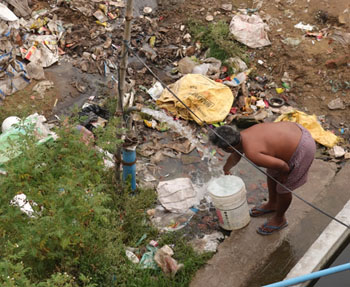Kolkata’s Struggle with Waste Management
Waste management is a crucial issue for any city, and Kolkata is no exception. As the capital of the Indian state of West Bengal, Kolkata is a major economic and cultural hub with a population of over 4.5 million people. With such a large population, the city generates a significant amount of waste – around 2,500 metric tons per day, according to data from the West Bengal Pollution Control Board. This waste must be managed in an effective and environmentally responsible manner. However, waste management in Kolkata has long been a challenge, with a history of inadequate infrastructure and inadequate attention to the problem.
One of the major issues with waste management in Kolkata is the lack of proper waste disposal facilities. In the past, much of the city’s waste was simply dumped in open landfills, which caused serious environmental and health problems. A study by the Indian Institute of Technology (IIT) in 2010 found that Kolkata had just two operational landfill sites, both of which were overcrowded and had reached capacity. The study also found that the city’s waste management infrastructure was inadequate, with a lack of proper waste segregation and recycling facilities. This lack of proper infrastructure has contributed to the city’s poor air quality – a report published by the World Health Organization (WHO) in 2014 ranked Kolkata as the third most polluted city in India, in terms of particulate matter (PM) 2.5 levels.
Another issue with waste management in Kolkata is the lack of proper infrastructure for waste collection and transportation. Many areas of the city lack proper bins and collection points, which leads to littering and illegal dumping. This, in turn, leads to problems with pests and vermin, as well as the spread of diseases.
Effective waste management is essential for the health and well-being of the people of Kolkata. Proper waste disposal and recycling helps to reduce pollution and protect the environment, while also conserving natural resources. In addition, proper waste management can create jobs and boost the local economy by providing opportunities for waste segregation and recycling. According to a 2017 report by the Central Pollution Control Board (CPCB), Kolkata has a recycling rate of just 5.6%, far below the national average of 11%. Improving waste segregation and recycling rates can help to reduce the amount of waste being sent to landfills and improve the city’s overall waste management practices.
Effective waste management is also important for the tourism industry in Kolkata. A city that is known for its pollution and poor waste management is unlikely to be a popular tourist destination. According to a study by the Ministry of Tourism, the tourism industry in Kolkata contributed around 4% to the state’s GDP in 2018. By improving waste management practices, Kolkata can become a more attractive place to visit and do business, which can help to boost the local economy.
Waste management is a critical issue for the city of Kolkata. While there have been some efforts to improve waste management practices in the city, more needs to be done to address the issues of inadequate infrastructure and lack of proper waste disposal facilities. By addressing these issues and implementing effective waste management strategies, Kolkata can improve the health and well-being of its citizens, protect the environment, and boost its economy.



The problems have been articulated quite well in this piece.It’s very important to bring the issue of waste management in Kolkata to light and educate readers about it.
Thanks for the information provided! I’m amazed by the positive impact this website has had on my life. The content has empowered me to make positive changes. ID : 3838473760